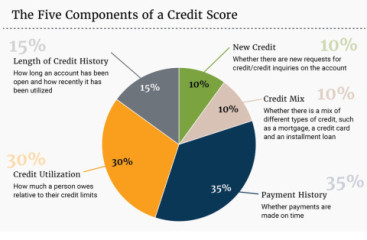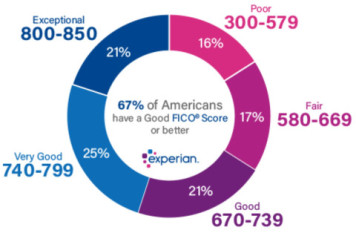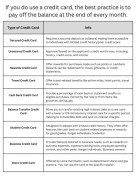 image of credit cards
Credit Scores & Credit Cards
image of credit cards
Credit Scores & Credit Cards
Using credit cards and borrowing money can provide financial flexibility, but it's important to use caution, understand the terms of the credit cards and loans, and make responsible choices to manage your finances effectively.
What is a Credit Score?
A credit score is a number (300-850) that shows lenders and financial institutions how trustworthy you are when it comes to borrowing money. It's a way for them to assess whether you're likely to pay back loans or credit card balances on time. A credit score is often looked at when you apply for car loans, house loans, rent an apartment, and even get a job.
What is a Credit Score Based On?  Components of a Credit Score by finred.usalearning.gov
Components of a Credit Score by finred.usalearning.gov
The biggest parts of your credit score are based on
- Payment History (making at least the minimum payments on time)
- Debt To Credit Ratio (you want to be under 30%).
Myth: You should carry a balance on your credit card(s) to build your credit.
If you pay off the balance every month on time, not only do you help your credit score, but you don't pay extra money due to interest.
Why does a person want a good credit score?
- Lowers the interest rate of loans
- Increases probability of being accepted for loans
- Lowers insurance premiums
- Looks good to future employers
 Credit Score Ranges by Experian
Credit Score Ranges by Experian
Fact: According to Forbes.com/Advisor, the average credit card interest rate for a person with good credit score is 17%, while a credit card intereste rate for a person with bad credit is 24% or more.
What causes a low credit score?
- Not paying at least the minimum payment on all credit cards and loans each month
- Not making payments on time
- Using more than 30% of your combined credit limits
- Opening or closing many lines of credit at once
How can a person build their credit?
- Open a Secured Credit Card (it's like a prepaid credit card)
- Report your rent payments to credit bureaus
- Become an authorized user on someone else's credit card that has a good credit score
- Take out a small personal loan from your bank and make payments each month on time
Recommended Actions for using Credit Cards
- Only spend on a credit card what you can pay off completely at then end of the month or sooner.
- Keep your debt to credit ratio below 30% (This represents the amount of total credit you are using divided by the total amount of credit available to you.)
- If you have credit cards that you are carrying a balance, get the balance paid off as soon as possible using one of these methods:
- Snowball: pay off the lowest amount of debt your have first (while paying the minimum payments on other credit cards if there's more than one). Then the next smallest amount and so on until all of the debt is paid.
- Avalanche: pay off the debt with the highest interest rate (while making the minimum payments on the other credit cards if there's more than one). Then the next highest interest rate and so on until all of the debt is paid.
- Before opening a credit card ask the following questions:
- How do I plan to use this credit card and manage payments on what I spend?
- What are the fees associated with the card, such as annual fees, late fees, balance transfer fees?
 Types of Credit Cards chart
Types of Credit Cards chart
- What is the interest rate or Annual Percentage Rate (APR) of the credit card?
- What is the credit card's credit limit?
- What type of credit card is it? (click on the chart)
- What are the rewards and benefits offered by the credit card?
- Check out this Credit Card Calculator.
Have questions? Want more individualized support about credit? Click here to meet with a mentor!
Want to learn more about credit and credit cards on your own time? Sign up for a FREE CashCourse account and start learning today.

